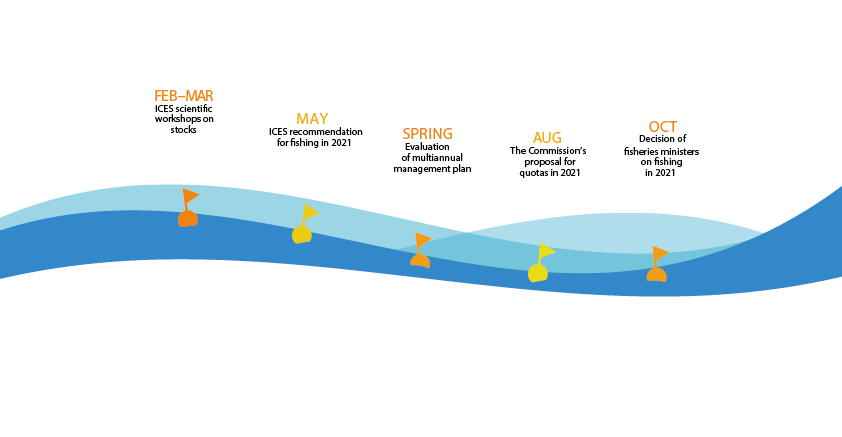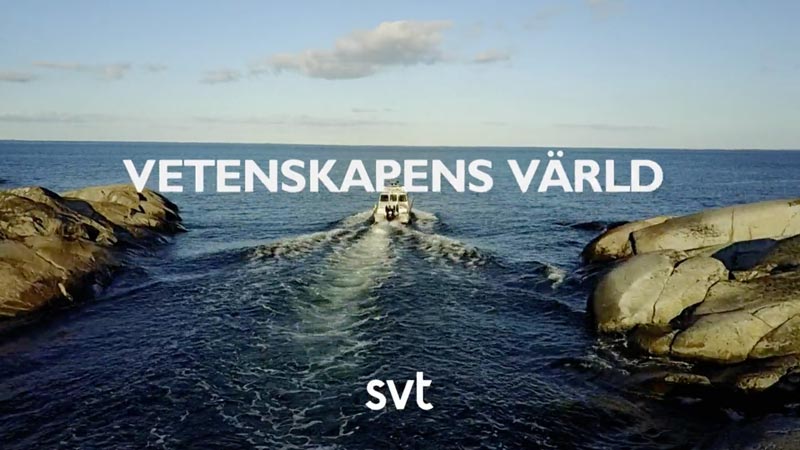Search press releases
Fisheries Brief no. 22: The fight for a sensible fisheries policy continues in 2020
Last autumn, for the first time, the Council of Ministers took a drastic decision on Baltic cod – setting the quota for all cod fishing in 2020 to zero. We summarised the decision in Fisheries Brief no. 21.
The decision means several crucial choices will need to be made regarding the fisheries policy and Baltic cod in 2020. Either EU fisheries ministers return to the annual horse trading on quotas or the ban on cod fishing continues and work gets under way on formulating a long-term action plan. BalticSea2020 and Save the Baltic Sea Cod will monitor this closely. Below is a list of some of the most important milestones in 2020:

Text in chart: FEB-MAR: ICES scientific workshops on stocks, MAY: ICES recommendation for fishing in 2021, SPRING: Evaluation of multiannual management plan, AUG: The Commission’s proposal for quotas in 2021, OCT: Decision of fisheries ministers on fishing in 2021.
The debate on fisheries policy continued throughout the autumn and winter. Here is a summary of some of the more important contributions:
In an opinion piece published in the business newspaper Dagens Industri at the start of January, BalticSea2020 summarised events in recent years and called for an end to large-scale trawling in the Baltic Sea. The article also pointed out that future management must put the ecosystem front and centre. Read the article here (in Swedish)
Growing criticism of industrial fishing
Industrial fishing for herring and sprat came under the spotlight after revelations on Sveriges Radio’s Kaliber programme about misreported landings; deliberately misreporting catch numbers can have a major impact on future quotas and also means that cod are deprived of an important food source: herring. Another aspect that has been highlighted is that industrial fishing competes with and drives out small-scale fishing operations. The county governors of Skåne, Blekinge and Kalmar wrote to the Swedish Agency for Marine and Water Management (SwAM) demanding more action be taken. Read the letter here (in Swedish)
Ten stakeholders in small-scale fishing, ranging from professional and recreational fishermen to restaurateurs, wrote an opinion piece in the Expressen newspaper criticising the overfishing of Baltic herring. They are demanding that the trawling limit for industrial fishing be extended and that the areas where Baltic herring pass the winter be fully protected. Read the article here (in Swedish)
In November, the government commissioned SwAM to investigate how fisheries controls can be tightened up. Read more on Sveriges Radio’s website (in Swedish)
Baltic cod in focus
The Swedish documentary programme Vetenskapens värld showed Folke Rydén’s final, retrospective film in his series about the Baltic Sea environment, which described, among other things, the collapse of Baltic cod stocks. Read more here (in Swedish)

Professor Christoph Humborg, Scientific Director of the Baltic Sea Centre at Stockholm University, contributed to a debate on SVT Opinion, noting that in order to save the cod we not only have to extend the ban on cod fishing, but also stop industrial fishing for herring and sprat, on which the cod feed. Listen to the interview here (in Swedish)
Fisheries policy a government flop
That was the headline of an editorial published by the newspaper Dagens Nyheter at the start of January. It describes the global situation as regards subsidies and overfishing, but points out that neither the EU nor Sweden are blameless. Read the article here (in Swedish)
Stay focused on what we can fix – fishing
The research world should, of course, be curious and study all possible causes of the crisis facing fish stocks in the Baltic Sea. These include, among other issues, anoxic bottoms, eutrophication and saltwater intrusion. Most recently, concerns have been raised about thiamine deficiency. The important thing is that research is not used by politicians and other stakeholders to play down the impact of fishing on the fisheries crisis. Neither thiamine deficiency nor the other conditions can be addressed within a reasonable time frame. We can, however, pursue a sensible fisheries policy, starting now. The challenges facing the Baltic Sea fishery are expertly summed up, from a Finnish perspective, in an interview with Professor Erik Bonsdorff. Read the article here
Click here to read Fisheries Brief no.22 in pdf
Click here to read previous Fisheries Briefs:
Fisheries Brief No. 1: How big is the fishing industry?
Fisheries Brief No. 2: Discards continue despite ban
Fisheries Brief No. 3: The Baltic Sea cod – a unique and isolated species
Fisheries Brief No. 4: The role of cod in the ecosystem
Fisheries Brief No. 5: Historically low catches of Baltic Sea cod
Fisheries Brief No. 6: Baltic Sea cod quotas
Fisheries Brief No. 7: Who is entitled to the fish?
Fisheries Brief No. 8: Is the Minister for Rural Affairs in charge of fishing matters?
Fisheries Brief No. 9: Responsibility rests with the fishery ministers
Fisheries Brief No. 10: EU’s fisheries policy spectacle damages cod
Fisheries Brief No. 11: Crucial year for Baltic cod
Fisheries Brief No. 12: Continued cod fishing is harmful
Fisheries Brief No. 13: List of measures for the Swedish Minister for Rural Affairs
Fisheries Brief no. 14: The system that fools itself
Fisheries Brief no. 15: Good job government! Now the real work begins
Fisheries Brief no. 16: Navigating the hidden perils of the fisheries policy
Fisheries Brief no. 17: Prioritise the environment over a handful of jobs
Fisheries Brief no. 18: The Commission proposes a zero quota
Fisheries Brief no. 19: Recovery takes time
Fisheries Brief no. 20: Crucial decisions in the short and long term
Fisheries Brief no. 21: Good decisions – but the fish in the Baltic Sea require a long-term solution










